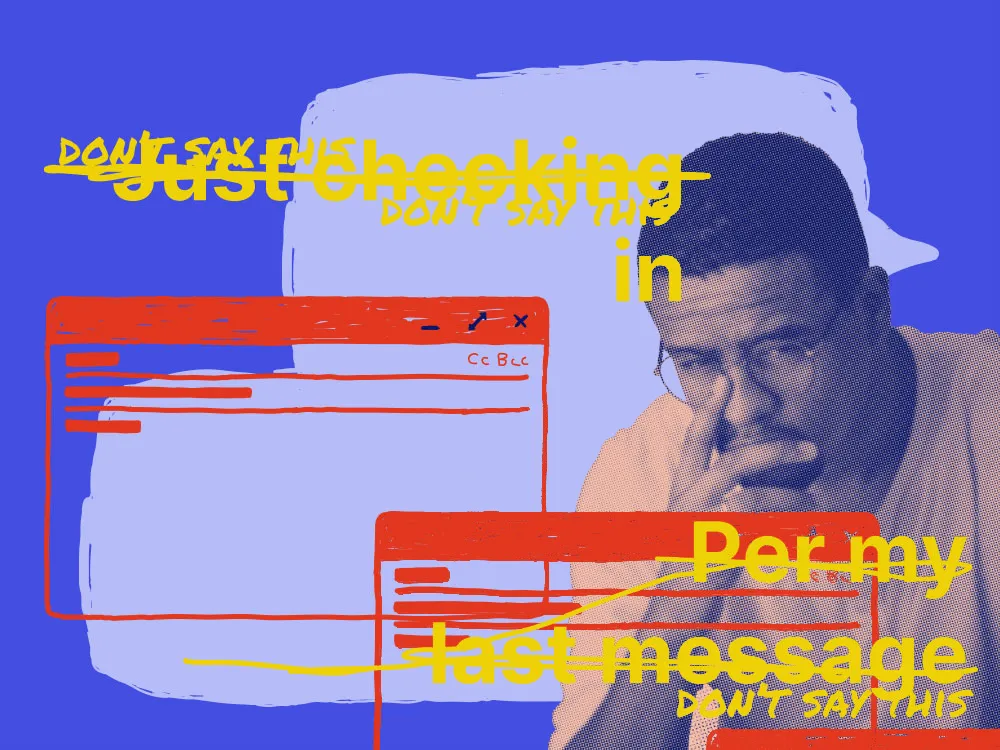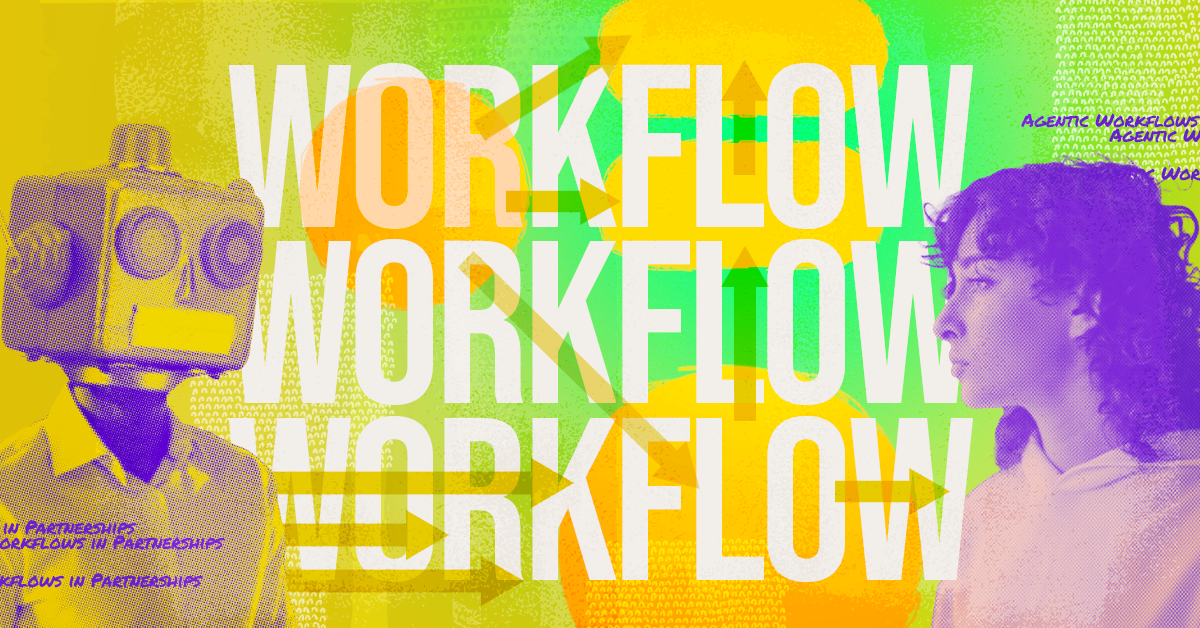We’re all guilty of it. You’re firing off a quick email and take too long to get to the point, burying the action item in a sea of workplace cliches and email lingo. These phrases are commonly used for a reason — they’re easily understood, polite ways to say what you mean (without always saying what you really mean).
But sometimes the phrases we use are just bad workplace email etiquette, inducing a few eye rolls from our coworkers (at best) and obscuring the real meaning of our communications (at worst).
If you’re guilty of overusing some of these business email phrases, you’re not alone. But it is time for an office jargon update. In this article, we’re calling out the 15 phrases we’d like to see less of and offering some helpful suggestions to replace them in your business email toolbox.
What is appropriate work email etiquette?
What is workplace email etiquette, anyway? Business email etiquette is the use of appropriate language in your email communications. Why is it so important? It shows that you value and can maintain your professional integrity (and that of your company, which is especially important if you work at a growing tech startup with a reputation to solidify).
It also shows that you care about your professional relationship with the recipient. Sending concise and appropriate emails will help save time that could be spent going back and forth, and can help build a positive working relationship.
Related: How co-marketing strategies can build trust and win you that deal.
Formal vs informal emails
A certain level of professionalism and formality is expected in most workplaces, especially when corresponding with senior employees or important external stakeholders. You want to make a positive impression and foster a successful working relationship, while still being personable and conversational where appropriate. And of course, it’s always important to avoid grammatical errors or information that’s just plain inaccurate. All this, and you want to ensure that your business correspondents receive timely responses? It’s no wonder so many of us turn to overused cliches to help save time and easily communicate ideas.
What are email cliches?
Email cliches are overused phrases that people tend to gloss over. They’re so standard that you may be typing them on autopilot. Examples of email cliches are “hope this email finds you well,” “please advise” and “let’s circle back.”
But don’t worry if you recognize a few from your own emails. We’ve got some replacements you can try out instead.

Work email phrases to avoid — and what to say instead — in the age of AI-driven email communications
Avoid: Happy ___ day
Usually, it’s just genuine positivity that leads you to wish everyone a happy day. Happy Monday, happy long weekend, happy almost Friday, you name it and we’ve certainly used it. Unfortunately, this opener is cliche at best and insincere at worst. Let’s be honest, no one really is happy that it’s Monday. The exception is actual holidays, like wishing your colleague a “happy end of Mercury retrograde season!” Some days deserve an extra celebration, but the 20th Monday of the year isn’t one.
Try saying this instead at work: If you’re looking to build a positive rapport and be more conversational, ditch this impersonal phrase and replace it with something individualized, like a question about a recent workshop you attended, or commentary on a podcast they’ve recommended. If nothing comes to mind, feel free to just scrap it altogether and get right to your point. Most people scan through their emails quickly and will appreciate a concise, well-written note without unnecessary fluff.
Avoid: Hope this email finds you well
This phrase has become overused to the point that it just »ĺ´Ç±đ˛ő˛Ô’t hold much sincerity anymore. Most recipients will scan over it without a thought or a response, which is a good sign that it’s not effective email language. There’s no call to action here; it’s just a general pleasantry that »ĺ´Ç±đ˛ő˛Ô’t require a response. Additionally, if it »ĺ´Ç±đ˛ő˛Ô’t find them well, there’s a good chance they may not be comfortable sharing why with you, anyway. What are they supposed to say? “Actually, it finds me unwell, thanks?”
Try saying this instead at work: Again, try to include something more personal to the recipient if appropriate. Personal »ĺ´Ç±đ˛ő˛Ô’t have to mean about their personal life. You can keep it professional and still let a colleague or client know that you listen and care about their interests or projects. If nothing comes to mind, why not save everyone time and kindly and professionally skip to the action item that you’re emailing them about?
Avoid: Sorry to bother you
Have you ever worked with Canadian colleagues? Some of us feel obliged to apologize for everything (including sending necessary work communications!), but it’s a surefire way to undermine your credibility. This is used often when emailing someone in a leadership position whose time you know is valuable; however, it’s counterproductive to waste anyone’s time having to scroll through apologies and over-explained context. It’s also worth noting that , and it can reinforce the idea that they’ve made some error. There is no need to admit wrongdoing when there’s been none.
Try saying this instead at work: Lead with an action item and then follow up with broader context if necessary. “I’m emailing to kindly request ___” and then thank them for their time. A thank you is always better than an apology when you want to add an acknowledgement around efforts.
Avoid: Just checking in
Are you just checking in, or are you passive-aggressively requesting a follow-up to a deadline or email? In a 19 per cent of respondents listed this phrase as the most annoying email cliche.
Try saying this instead at work: Emails like this don’t provide any value and tend to clog up inboxes. If you need to remind someone of a deadline, just do that! Your follow-up email should offer some value or an actionable item, which you can include in the subject line to catch their interest (and ensure your email will be opened).
Avoid: Per my last message
This is another sneakily passive aggressive phrase that basically means, “Can’t you read?” This was rated the second most annoying email phrase by the same , with 33 per cent of respondents voting it their most hated phrase.
Try saying this instead at work: Rather than point out that they missed your original point, find another way to restate your initial message, especially where you need to manage the relationship with sensitivity. Try “I want to emphasize the importance of ___ in this matter.” If you’re dealing with an internal colleague, perhaps a Slack message or phone call might settle the issue faster.
‍Related: These tips will help with screen fatigue and improve your productivity.
Avoid: Greatly appreciated
The sentiment here is good. Showing appreciation for people’s time and expertise is an excellent way to strengthen a working relationship, as most people like to feel valued (who »ĺ´Ç±đ˛ő˛Ô’t love that?). But for many audiences, this is a too-formal phrase that can feel stuffy. has found that the best way to end an email is with a simple, sincere phrase.
Try saying this instead at work: “Tłó˛ą˛Ô°ě˛ő.”
Avoid: Let’s circle back
This is one that’s used often, despite being widely disliked (for example, ). Perhaps the reason it’s so widely disliked is that it implies there is currently no time to address or solve the problem, and there will be further meetings and emails to continue discussions about it.
Try saying this instead at work: There are a handful of different ways you can phrase this: “Let’s revisit this point later,” and so on, but they’re just saying the same thing, and often, less efficiently. We suggest setting a follow-up meeting with a problem-solving agenda, so you’re only circling back once.
Avoid: Please advise
“Please advise” also makes the study’s list of most annoying phrases, landing at number seven. The addition of the word “please” »ĺ´Ç±đ˛ő˛Ô’t help this hated business email phrase any. It can sound overly formal and just a bit condescending.
Try saying this instead at work: You can opt for more approachable language like, “What do you think?” or “Could you recommend?". Avoiding wordy ways of asking for help is key to a more approachable phrase in this case. This is another situation where we’d suggest a quick Slack message or phone call to follow up with internal colleagues, if possible, rather than sending what can come off as a passive-aggressive email.
Avoid: Thanks in advance
We’ve already talked about the benefits of gratitude in the workplace, so why does this seemingly polite email etiquette phrase make the list? Those polled in the survey seem to be split, with it making the top 10 most annoying workplace email cliches, yet also being voted as one of the top five acceptable email sign-offs. Perhaps the differentiating factor is that as a signature it implies, “Thanks for reading me!” while as an action item within the email body, it seems to be thanking the respondent for taking on work that they have not yet agreed to.
Try saying this instead at work: Don’t be shy about using this to sign off, but tread carefully when using it elsewhere in your business emails. “Thanks for considering this request” or “I’d be grateful for your help/insight” might be phrases that are met more favorably.
Avoid: Sincerely
Okay, we get it. Email sign-offs can be tough. It’s hard to strike the right tone between a professional email closing or one of the playful (but not-so-professional) . While we're laughing at the idea of signing every correspondence with “Live, laugh and leave me alone,” it’s important to have some sort of standard sign-off that you can use with a mixed crowd, because you never know who may be copied on your next email. Stick to something that »ĺ´Ç±đ˛ő˛Ô’t feel so insincere.
Try saying this instead at work: If you don’t know the recipient well, keep it simple with an uncontentious “Thanks” or “Regards.”

Avoid: Let’s take this offline
“Let’s take this offline” is a cliche that suggests “You’re taking up too much of my time” or “I don’t want to read all that.” Unless you have a good relationship with the recipient, it can make them feel as if the issue isn’t important.
Try saying this instead at work: “Let’s schedule a quick 1:1 to discuss this” or “I’ll send you a message on Slack.” Depending on your workplace culture and your relationship with the person, you can give them a call or shoot them a text.
Avoid: Let’s synergize
This is another phrase that people often interpret as “let’s talk about this later when I have more time.” On the flip side, the recipient may not have time for a full-length brainstorm. They may just want to quickly get on the same page!
Try saying this instead at work: Consider “Let’s book some time to talk, so we can achieve X.” This ensures you have the same goal in mind. And if you don’t, at least now you can get clarity before you spend an hour working toward the wrong outcome.
Avoid: Looping in X
Why are you looping them in? What role are they going to play? What else should they be looped in on? For the sake of your projects and your shared goals, communicate the intent behind different actions.
Try saying this instead at work: “CC’ing Marcus because he’ll be handling the design side of things. Would you please cc him on anything design related?”
Avoid: Leveraging AI for scale
If there were a record for how quickly a phrase could become a cliche, “leveraging AI for scale” would shatter all of them. It’s a cop-out phrase that people will automatically interpret in their own way based on your company’s culture. AI is here to stay, but it’s important to keep things human by communicating how and where it’ll be used.
Try saying this instead at work: “We’re applying AI to automate audience segmentation and contact list creation.” You can also add information about what you still expect your team members to do, such as developing personalized communications for Tier 1 accounts.
Avoid: This was generated by AI
While it’s understandable that people want to be transparent, this approach seems cold and impersonal. It can also give the impression that it’s not worth reading what you’ve sent.
Try saying this instead at work: “I’ve started this first draft using AI, but it needs a human touch.”
Read more: Jobs that are growing with the rise of AI.
Rapid-fire round: Words to avoid in emails
- Sincerely yours: Avoid anything too formal or personal. If it sounds like it would be used in a movie about long-lost lovers or friends communicating across a war zone, swap it out for a “Thank you” or “Kind regards.”
- Forwarding: This gives the impression that the information isn’t important or worth paying attention to, or that you’re just playing a game of CYA. As a result, people may skim or completely skip your email. Consider providing a line or two of context for why this email matters.
- Try to: This phrase is often added for politeness, but it can come off as either passive aggressive or condescending. A simple “Please send this back by Friday” includes a direct ask while also being polite.
- Literally or really: Unless these words are “literally” necessary, scrap them if you’re using them to emphasize a point. They’re more useful for verbal communications.
- ‍Amazing: This often comes across as insincere rather than genuine feedback. Consider replacing it with a sentence that specifically references what the person did well.
















